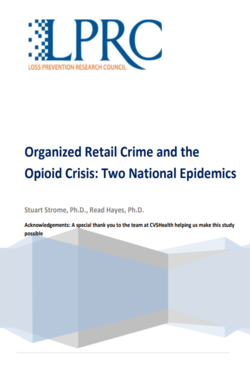Organized Retail Crime and the Opioid Crisis: Two National Epidemics
By Stuart Strome and Read Hayes
Organized Retail Crime (ORC) is large-scale theft or fraud of consumer products by groups of professional criminals. ORC includes more than just in-store theft, encompassing a variety of retail crimes, including shoplifting, gift card fraud, receipt and return fraud, ticket switching, cargo theft, as well as associated crimes such as forgery, money laundering, transportation of stolen goods across state lines, and racketeering. Due in part to the ability to easily resell certain items, ORC groups often target high-demand products (Clarke 1999; Smith 2018). ORC is a perennial problem for retailers, costing them billions of dollars in lost sales. According to one report, ORC is responsible for a loss of $700,000 per every one billion dollars in sales (NRF 2017, ). Furthermore, ORC affects almost every category of retail, as 94% of retailers reported being victims. Therefore, understanding this costly problem, and its relationship to other types of crime is key to understanding how to better combat ORC. The rise of ORC as an endemic phenomenon coincides with the increase in illicit use and sale of opioids in the United States. Deaths from opioid overdose exceeded 42,000 in 2017, and deaths from powerful synthetic opioids, such as fentanyl, have doubled between 2015 and 2017 (Morgan and Jones 2018), . A recent publication places the costs of the opioid crisis at $500 billion, although estimates range as high as $1 trillion (Ryan 2018). Indeed, this epidemic has coincided with a rise in arrests for opioid possession, and there is some speculation that the opioid crisis is related to recent rises in the homicide rate (Rosenfeld 2018, ; Kennedy and Abt 2016). However, while a recent article by CNBC sheds light on the potential relationship between the opioid crisis and ORC, there is little systematic study on that relationship (Brewer and Zamost 2017). More importantly, understanding the relationship between ORC and the opioid crisis necessitates better understanding what drives opioid offenders, and how their patterns of crime, and motivations, differ from other offenders.
Gainesville, FL: Loss Prevention Research Council, 2019? 12p.


